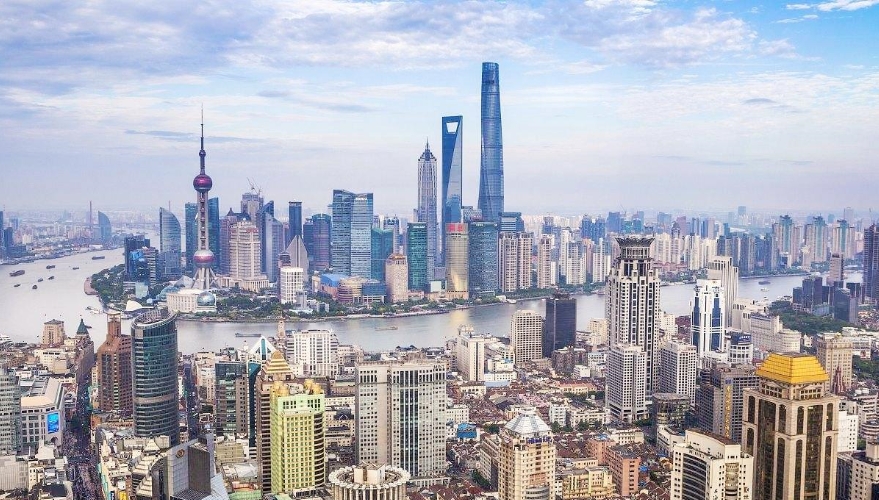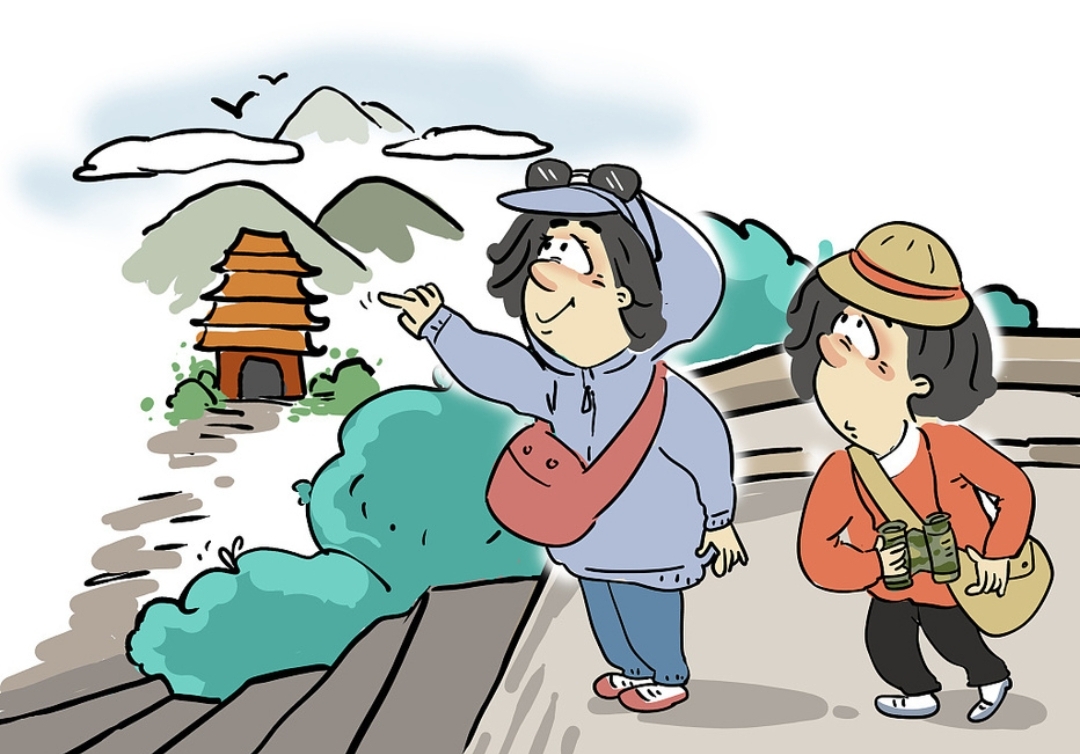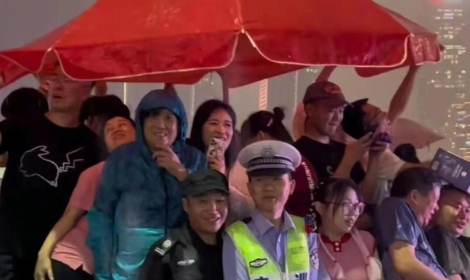为什么这么多美国人不明白中国已经有多先进了?
正文翻译

QA回答:为什么这么多美国人不明白中国已经有多先进了?

QA回答:为什么这么多美国人不明白中国已经有多先进了?
评论翻译
Sharon Tenney
So, true. Many people still think of the “old” China. If one has not been there, they just can’t really imagine it. In the U.S. there are still very old stereotypes. And, also, in the U.S. we don’t have brand new shiny cities. Everything is starting to fall apart, so to try to explain how quickly China has advanced is difficult unless one has been there.
所以,确实如此。很多人仍然对“旧”中国抱有一些刻板印象。如果一个人没有亲自去过那里,他们真的无法想象。在美国,仍然存在着一些非常陈旧的刻板印象。而且,在美国我们并没有崭新的城市。一切都开始崩溃,所以要试图解释中国的快速发展是很困难的,除非有人去过那里。
My daughter and I went to China because she was going to university in Hong Kong. We also had a high school foreign exchange student from China - a VERY oppositional girl. That was our first eye-opener. My daughter was learning Japanese, and there were no Japanese exchange students available. Naively, we thought they were similar (this was at least 15 years ago). lol Wow, very different! She was also a virtuoso violinist who traveled the world and famous in her field at the time. She was extremely oppositional! We lived in the woods of California at the time, and she’d run off and we couldn’t find her… She was extremely expressive! Her English was almost perfect. Her math was higher than anything we had in our high schools. I am more east coast, whereas my daughter was raised in the West Coast of U.S. so my daughter had difficulty with her aggressiveness. I actually enjoyed her vivacious personality, except for times when she became out of control and I had to give her consequences (which I don’t think she had much of in China).
我的女儿和我去了中国,因为她要去香港的一所大学上学。我们还接待了一名来自中国的高中交换生,一个非常反叛的女孩。那次中国让我们第一次眼界大开。我女儿当时正在学习日语,而没有日本的交换生可供选择。天真地,我们以为他们很相似(那是至少15年前的事了)。哈哈,哇,非常不同!她还是一个在世界各地巡演并在当时在她的领域中小有名气的小提琴演奏家。她极其反叛!当时我们住在加利福尼亚的树林中,她会跑掉,我们找不到她……她非常善于表达!她的英语几乎完美。她的数学水平比我们高中的任何课程都要高。我更偏东海岸,而我的女儿是在美国西海岸长大的,所以我女儿很难应对她的侵略性。我其实很喜欢她活泼的个性,除了当她失控时我不得不给她想想后果怎么处理(我认为她在中国可能没有太多这样的经历)。
Her mother was in banking and often came to the U.S. and when she was in California, she’d call me from where she was just to say “Hi.” When we finally got to Shanghai, we were very impressed. I know HK went back to the Chinese, and we were there prior to that. But HK, too, is Chinese culture and we adored it. So I guess having a foreign exchange student was quite helpful to us to know intimately what a Chinese girl was like (at least ours - lol). We grappled over stereotypes on both sides - like, she thought Americans ate Kentucky Fried Chicken every night. What a shock to her that we actually cooked our meals each evening. There are so many things we learned from that experience. So, we didn’t go to China with blinders on.
她的母亲在银行工作,经常来美国,当她在加利福尼亚的时候,她会给我打电话,只是为了打个招呼。当我们最终来到上海时,我们印象深刻。我知道香港归中国了,而我们是在那之前去的。但香港也是中国文化,我们很喜欢。所以我想,交换生对我们来说是非常有帮助的,可以更加亲密地了解一个中国女孩是什么样子的(至少是我们家的那个 - 哈哈)。我们在双方都有关于刻板印象的争论——比如,她认为美国人每天晚上都吃肯德基。她对我们实际上每天晚上都烹饪我们的饭菜感到很震惊。从这次经历中我们学到了很多东西。所以,我们去中国并不是带着有色眼镜。
I am very impressed with China, although I do have an older friend who served in the Navy and when he had been there, it was people who were very poor, little houses, no high-rises, no modern cities. When we showed him the photos of China now, he was in shock. He really did think of people in grey suits. China has quickly advanced.
我对中国印象深刻,尽管我有一位在海军服役的年长朋友,当他去过那里时,那里的人们都很贫困,房子很小,没有高楼大厦,也没有现代化的城市。当我们给他看中国现在的照片时,他感到非常震惊。他真的认为中国的人们都穿着灰色西装。中国迅速发展。
I can see why there are stereotypes about China, and I’m not surprised that many Americans don’t know what it is like now.
我能理解为什么有关中国的刻板印象,我也不奇怪很多美国人不知道它现在是什么样子。
I am also surprised that so many Americans assume so much. Unless one has experienced a particular country, language or culture, it is not good to stereotype. I do have friends who are interested in other countries, who will talk about another culture, but all they know is what they see on TV. There’s really no good way to know unless you actually go there. I have suggested that they travel to other countries, but they say that they get “enough” information on television — obviously, not true.
我还感到惊讶的是,很多美国人对很多事情都有假设。除非有人亲身经历了某个国家、语言或文化,否则刻板印象是不好的。我有一些对其他国家感兴趣的朋友,他们会谈论其他文化,但他们所知道的一切都是通过电视看到的。实际上,除非你真的去过那里,否则很难知道。我建议他们去其他国家旅行,但他们说他们在电视上得到了足够的信息——显然并不正确。
Our experience of China went beyond just seeing it in person. We had our outrageous foreign exchange student from whom we really learned a lot, my daughter’s first boyfriend had immigrated from Canton, and, obviously, we have Chinese in California. But to BE there in person, to interact with the people, it was amazing. The architecture is amazing, but so were the people. Hong Kong, too, was amazing, but in a different way. We had people come up to us as we were trying to find someplace on a map and then escort us to that place.
我们对中国的体验不仅仅停留在亲身看到它。我们有我们那个古怪的交换生,我们真的从她那里学到了很多东西,我女儿的第一个男朋友是从广州移民过来的,显然我们在加利福尼亚也有中国人。但亲自去那里,与人们互动,真是太惊人了。建筑令人惊叹,但人们也是如此。香港也是如此,但方式不同。我们在试图在地图上找某个地方时,有人走到我们面前,然后护送我们去那个地方。
One time in a park in Shanghai a walking band - with all sorts of instruments - came by, scarves waving, and cool music. It just suddenly appeared, seemingly out of no where!
有一次在上海的一个公园里,一支行进中的乐队——各种乐器——走过,围巾飘动,奏着酷炫的音乐。它似乎突然出现在我们面前,就像从天而降一样!
We were absolutely impressed by the cleanliness and the transportation, especially the trains. And the Chinese underground where the trains were had been made into malls. Not to mention that there was a clear plastic barrier to keep people from falling onto the train tracks (unlike NYC which should certainly emulate China…)
我们对那里的清洁度和交通,尤其是火车,印象深刻。而且中国地铁里的车站已经变成了购物中心。更不用说有一个透明的塑料屏障防止人们掉到铁轨上(不像纽约市,肯定应该效仿中国……)
I met strangers on the street and even though I couldn’t speak Chinese nor they English, we had interactions (one is too long to tell, but was amazing) and we still “understood” each other (lots of laughing and gesturing, too).
我在街上遇到陌生人,即使我不会说中文,他们也不会说英语,我们之间还是有互动的(其中一个故事太长了,但真的很惊人),我们仍然“理解”对方(还有很多笑和手势)。
So, for me, I felt somewhat immersed in Chinese culture, and especially with our exchange student, we got a good feeling for how expressive people can be! Living with a Chinese teenager can teach you a lot! And that’s why I like China. :)
所以,对我来说,我在中国文化中有一些沉浸的感觉,特别是与我们的交换生在一起,我们对人们可以有多么富有表现力有了很好的感觉!和一个中国的青少年生活在一起真的可以教你很多东西!这就是为什么我喜欢中国。 :)
回复翻译:
Brooks Hurd
I have been to China many times. I understand what is happening in China. It is hard not to be impressed after landing at one of the world’s largest airports and taking the Maglev to Longyang Station at 430 km/hr. This is the fastest commercial ground transportation system on the planet.
我去过中国很多次。我了解中国正在发生的事情。在降落在世界上最大的机场之一并搭乘磁悬浮列车以每小时430公里的速度到达龙阳站后,很难不感到印象深刻。这是地球上最快的商业地面交通系统。
图1略
Shanghai has huge and growing subway system. In the downtown area of Puxi, there are multiple levels of highways.
上海拥有庞大且不断发展的地铁系统。在浦西市中心地区,有多层次的高速公路。
I went to Semicon China last year and saw a vending machine that only accepted WePay, no cash or credit cards. This simply follows the trend to allow everyone to accept payments phone to phone. Unlike with Square, there is no additional hardware required to use WePay, since your smartphone already has the ability to scan QR codes.
我去年参加了中国半导体展览会,看到了一台只接受微信支付的自动售货机,不接受现金或信用卡。这只是追随允许每个人通过手机进行支付的趋势。与Square不同,使用微信支付不需要额外的硬件,因为您的智能手机已经具备扫描二维码的功能。
The high-speed rail system connects the country in a way that makes the ICE, TGV or Shinkansen look small by comparison.
高铁系统以一种使ICE、TGV或新干线相形见绌的方式连接了整个国家。
图2略
When I first went to China in the 1990s, little of this existed. There were no multi-level highways in Shanghai. There was no Maglev, nor Pudong airport. The subway was partially built but the high-speed rail network was still a dream.
当我在1990年代初次去中国时,这一切都还很小。上海没有多层次的高速公路。那时没有磁悬浮,也没有浦东机场。地铁只建了一部分,高铁网络还是一个梦想。
There may be people who believe that China is a poor country living in the last century without the benefits of modern technology. All I can say is that they should visit China and see the reality with their own eyes.
可能有人认为中国是一个生活在上个世纪的贫穷国家,没有现代技术的好处。我只能说,他们应该亲自去中国,亲眼看看现实。
Sthitapragnya Deshpande
A few reasons (and this is true for people outside the US as well) -
一些原因(对于美国之外的人也是如此)-
Most of them do not know what a typical Chinese city looks like today. How modern they are, how financially better off ordinary Chinese people are (clue - a worker in China also has a proper brick and mortar house to live in, eats good fresh meals thrice a day, gets reasonable medical health care, gets a bonus each year, and usually signs on contracts of 1 year, and rarely has to worry about unemployment)
大多数人不知道今天的中国城市是什么样的。它们有多现代化,普通中国人经济状况有多好(线索 - 在中国,工人也有一所适当的砖砌房子,每天吃三顿美味的饭菜,享受合理的医疗保健,每年得到一笔奖金,通常签订一年的合同,很少担心失业)
Most are brought up either on Nat Geo ‘megafactories’ documentaries, the popular news media rhetoric (clue - NYT and WaPo hardly have many reporters living in China), or old-time documentaries dating from the 1950s, 60s, 70s, and 80s!
大多数人要么接受过国家地理“巨型工厂”纪录片的教育,要么接受过流行的新闻媒体言辞的教育(线索 - 纽约时报和华盛顿邮报几乎没有多少记者生活在中国),或者接受过上世纪50年代、60年代、70年代和80年代的老纪录片的教育!
We have all been indoctrinated into the idea that communist = bad, democracy = good and developed. Hence we simply cannot imagine that a country that is not a conventional democracy (the CPC has regular elections that involve 90 million voters) can be developed.
我们都被灌输了这样一个观念,即gczy = 不行,民主 = 好和发达。因此,我们简直无法想象一个不是传统民主制度的国家(中国定期进行涉及9000万选民的选举)也能够发达。
Few Americans have visited China and seen the country and its development for themselves. Few of them have interacted with people who have visited the country. Chinese language websites that regularly show this are unknown outside the country. Ditto even for English language Chinese websites (People's Daily and xinhua give a pretty accurate idea of what the country is like, especially if the images - and they are flush with thousands of images - even if what they type is partly propaganda)
很少有美国人访问过中国,并亲眼见到这个国家及其发展。很少有人与曾访问过这个国家的人交往。定期展示这一切的中文网站在国外是未知的。即使对于英文中文网站也是如此(《人民日报》和新华社提供了关于这个国家的相当准确的信息,尤其是图片——它们充满了成千上万的图片——即使它们所写的内容在一定程度上是宣传的一部分)
Colin Riegels
To be fair, it is not just China but Asia generally (well, probably the world generally - but let’s keep it manageable). When I lived in Asia and my wife’s relatives would come to visit, they were invariably quite taken by just how developed the airports, transport systems, and cities were in Asia. Compare landing at Boston Logan and taking the decrepit subway into town with landing at Hong Kong and taking the express to the center of town (or better yet, being able to check in and drop your luggage in the center of town at the airport express terminal when leaving).
公正地说,这不仅仅是中国的情况,而是整个亚洲(好吧,可能是整个世界 - 但让我们保持可管理性)。当我住在亚洲时,我妻子的亲戚来访时,他们总是对亚洲的机场、交通系统和城市有多么发达感到很惊讶。比较一下在波士顿洛根机场降落然后搭乘破旧的地铁进城,与在香港降落然后搭乘直通车到市中心相比(或者更好的是,在离开时能够在机场快线站的市中心办理登机手续和寄存行李)。
Popular perceptions in America about what Asia is like don’t bear much resemblance to the reality, and relatively few Americans travel there. So the world of gleaming, super-efficient airports, and hi-tech cities might as well be on the moon for all that it enters their daily perception.
美国人对亚洲的普遍看法与现实并不太相似,而且相对较少的美国人前往那里。因此,那闪闪发光的、超级高效的机场和高科技城市的世界对于他们的日常感知来说,就像是在月球上一样。
Paul Sutton
There’s an old joke that goes “What do you call someone who speaks more than one language?” Answer: “multilingual.” Question: “What do you call someone who only speaks one language?” Answer: “An American.”
大家常说的一个笑话是:“你怎么称呼一个会说多种语言的人?”回答:“多语言者。”问题:“你怎么称呼只会说一种语言的人?”回答:“美国人。”
Most Americans never get much more than a few miles from where they were born and grew up. Fewer still ever leave the country. It used to be during the days of a universal draft that many young American men got drafted into the service, and then sent overseas on assignment. For many, if not most of them, it was their first time out of the country. Most were astounded to find out that life in other parts of the world was much different from what the pictures in their 20-year-old “Social Studies” books depicted. The world was modern, many people spoke English, the food was great, restaurants and bars were convivial and fun, and transportation was so abundant that if one were stationed in Germany, hopping a train to France or Italy for the weekend was a piece of cake. It was a broadening experience.
大多数美国人几乎离开他们出生和成长的地方不远。更少的人离开国家。在强制兵役的时代,许多年轻的美国男子被征召服役,然后被派往海外任务。对于许多人来说,如果不是大多数人,这是他们第一次出国。大多数人惊讶地发现,与他们20岁时的“社会研究”书中所描述的世界不同,其他地区的生活要现代得多,很多人说英语,食物很美味,餐馆和酒吧热情而有趣,交通非常便利,以至于如果一个人驻扎在德国,周末搭火车去法国或意大利简直是小菜一碟。这是一种开阔的经历。
Now, without a draft, and with stations like FOX News telling everyone who will listen how hostile the world is with “no-go” zones even in places like London, most Americans have never left the lower-48 and have a view of the rest of the world that is hopelessly outdated, if it ever was true. Being insular just ensures that one’s children grow up even more insular, and so it goes.
现在,没有强制征兵,而且像福克斯新闻这样的电视台告诉每个愿意听的人,整个世界都是多么的敌对,甚至在伦敦等地也有“禁区”,大多数美国人从未离开过美国本土,他们对世界其他地区的看法已经是无望的陈旧了,即使它曾经是真实的。孤立只会确保一个人的孩子长大后变得更加孤立,如此循环。
So, true. Many people still think of the “old” China. If one has not been there, they just can’t really imagine it. In the U.S. there are still very old stereotypes. And, also, in the U.S. we don’t have brand new shiny cities. Everything is starting to fall apart, so to try to explain how quickly China has advanced is difficult unless one has been there.
所以,确实如此。很多人仍然对“旧”中国抱有一些刻板印象。如果一个人没有亲自去过那里,他们真的无法想象。在美国,仍然存在着一些非常陈旧的刻板印象。而且,在美国我们并没有崭新的城市。一切都开始崩溃,所以要试图解释中国的快速发展是很困难的,除非有人去过那里。
My daughter and I went to China because she was going to university in Hong Kong. We also had a high school foreign exchange student from China - a VERY oppositional girl. That was our first eye-opener. My daughter was learning Japanese, and there were no Japanese exchange students available. Naively, we thought they were similar (this was at least 15 years ago). lol Wow, very different! She was also a virtuoso violinist who traveled the world and famous in her field at the time. She was extremely oppositional! We lived in the woods of California at the time, and she’d run off and we couldn’t find her… She was extremely expressive! Her English was almost perfect. Her math was higher than anything we had in our high schools. I am more east coast, whereas my daughter was raised in the West Coast of U.S. so my daughter had difficulty with her aggressiveness. I actually enjoyed her vivacious personality, except for times when she became out of control and I had to give her consequences (which I don’t think she had much of in China).
我的女儿和我去了中国,因为她要去香港的一所大学上学。我们还接待了一名来自中国的高中交换生,一个非常反叛的女孩。那次中国让我们第一次眼界大开。我女儿当时正在学习日语,而没有日本的交换生可供选择。天真地,我们以为他们很相似(那是至少15年前的事了)。哈哈,哇,非常不同!她还是一个在世界各地巡演并在当时在她的领域中小有名气的小提琴演奏家。她极其反叛!当时我们住在加利福尼亚的树林中,她会跑掉,我们找不到她……她非常善于表达!她的英语几乎完美。她的数学水平比我们高中的任何课程都要高。我更偏东海岸,而我的女儿是在美国西海岸长大的,所以我女儿很难应对她的侵略性。我其实很喜欢她活泼的个性,除了当她失控时我不得不给她想想后果怎么处理(我认为她在中国可能没有太多这样的经历)。
Her mother was in banking and often came to the U.S. and when she was in California, she’d call me from where she was just to say “Hi.” When we finally got to Shanghai, we were very impressed. I know HK went back to the Chinese, and we were there prior to that. But HK, too, is Chinese culture and we adored it. So I guess having a foreign exchange student was quite helpful to us to know intimately what a Chinese girl was like (at least ours - lol). We grappled over stereotypes on both sides - like, she thought Americans ate Kentucky Fried Chicken every night. What a shock to her that we actually cooked our meals each evening. There are so many things we learned from that experience. So, we didn’t go to China with blinders on.
她的母亲在银行工作,经常来美国,当她在加利福尼亚的时候,她会给我打电话,只是为了打个招呼。当我们最终来到上海时,我们印象深刻。我知道香港归中国了,而我们是在那之前去的。但香港也是中国文化,我们很喜欢。所以我想,交换生对我们来说是非常有帮助的,可以更加亲密地了解一个中国女孩是什么样子的(至少是我们家的那个 - 哈哈)。我们在双方都有关于刻板印象的争论——比如,她认为美国人每天晚上都吃肯德基。她对我们实际上每天晚上都烹饪我们的饭菜感到很震惊。从这次经历中我们学到了很多东西。所以,我们去中国并不是带着有色眼镜。
I am very impressed with China, although I do have an older friend who served in the Navy and when he had been there, it was people who were very poor, little houses, no high-rises, no modern cities. When we showed him the photos of China now, he was in shock. He really did think of people in grey suits. China has quickly advanced.
我对中国印象深刻,尽管我有一位在海军服役的年长朋友,当他去过那里时,那里的人们都很贫困,房子很小,没有高楼大厦,也没有现代化的城市。当我们给他看中国现在的照片时,他感到非常震惊。他真的认为中国的人们都穿着灰色西装。中国迅速发展。
I can see why there are stereotypes about China, and I’m not surprised that many Americans don’t know what it is like now.
我能理解为什么有关中国的刻板印象,我也不奇怪很多美国人不知道它现在是什么样子。
I am also surprised that so many Americans assume so much. Unless one has experienced a particular country, language or culture, it is not good to stereotype. I do have friends who are interested in other countries, who will talk about another culture, but all they know is what they see on TV. There’s really no good way to know unless you actually go there. I have suggested that they travel to other countries, but they say that they get “enough” information on television — obviously, not true.
我还感到惊讶的是,很多美国人对很多事情都有假设。除非有人亲身经历了某个国家、语言或文化,否则刻板印象是不好的。我有一些对其他国家感兴趣的朋友,他们会谈论其他文化,但他们所知道的一切都是通过电视看到的。实际上,除非你真的去过那里,否则很难知道。我建议他们去其他国家旅行,但他们说他们在电视上得到了足够的信息——显然并不正确。
Our experience of China went beyond just seeing it in person. We had our outrageous foreign exchange student from whom we really learned a lot, my daughter’s first boyfriend had immigrated from Canton, and, obviously, we have Chinese in California. But to BE there in person, to interact with the people, it was amazing. The architecture is amazing, but so were the people. Hong Kong, too, was amazing, but in a different way. We had people come up to us as we were trying to find someplace on a map and then escort us to that place.
我们对中国的体验不仅仅停留在亲身看到它。我们有我们那个古怪的交换生,我们真的从她那里学到了很多东西,我女儿的第一个男朋友是从广州移民过来的,显然我们在加利福尼亚也有中国人。但亲自去那里,与人们互动,真是太惊人了。建筑令人惊叹,但人们也是如此。香港也是如此,但方式不同。我们在试图在地图上找某个地方时,有人走到我们面前,然后护送我们去那个地方。
One time in a park in Shanghai a walking band - with all sorts of instruments - came by, scarves waving, and cool music. It just suddenly appeared, seemingly out of no where!
有一次在上海的一个公园里,一支行进中的乐队——各种乐器——走过,围巾飘动,奏着酷炫的音乐。它似乎突然出现在我们面前,就像从天而降一样!
We were absolutely impressed by the cleanliness and the transportation, especially the trains. And the Chinese underground where the trains were had been made into malls. Not to mention that there was a clear plastic barrier to keep people from falling onto the train tracks (unlike NYC which should certainly emulate China…)
我们对那里的清洁度和交通,尤其是火车,印象深刻。而且中国地铁里的车站已经变成了购物中心。更不用说有一个透明的塑料屏障防止人们掉到铁轨上(不像纽约市,肯定应该效仿中国……)
I met strangers on the street and even though I couldn’t speak Chinese nor they English, we had interactions (one is too long to tell, but was amazing) and we still “understood” each other (lots of laughing and gesturing, too).
我在街上遇到陌生人,即使我不会说中文,他们也不会说英语,我们之间还是有互动的(其中一个故事太长了,但真的很惊人),我们仍然“理解”对方(还有很多笑和手势)。
So, for me, I felt somewhat immersed in Chinese culture, and especially with our exchange student, we got a good feeling for how expressive people can be! Living with a Chinese teenager can teach you a lot! And that’s why I like China. :)
所以,对我来说,我在中国文化中有一些沉浸的感觉,特别是与我们的交换生在一起,我们对人们可以有多么富有表现力有了很好的感觉!和一个中国的青少年生活在一起真的可以教你很多东西!这就是为什么我喜欢中国。 :)
回复翻译:
Brooks Hurd
I have been to China many times. I understand what is happening in China. It is hard not to be impressed after landing at one of the world’s largest airports and taking the Maglev to Longyang Station at 430 km/hr. This is the fastest commercial ground transportation system on the planet.
我去过中国很多次。我了解中国正在发生的事情。在降落在世界上最大的机场之一并搭乘磁悬浮列车以每小时430公里的速度到达龙阳站后,很难不感到印象深刻。这是地球上最快的商业地面交通系统。
图1略
Shanghai has huge and growing subway system. In the downtown area of Puxi, there are multiple levels of highways.
上海拥有庞大且不断发展的地铁系统。在浦西市中心地区,有多层次的高速公路。
I went to Semicon China last year and saw a vending machine that only accepted WePay, no cash or credit cards. This simply follows the trend to allow everyone to accept payments phone to phone. Unlike with Square, there is no additional hardware required to use WePay, since your smartphone already has the ability to scan QR codes.
我去年参加了中国半导体展览会,看到了一台只接受微信支付的自动售货机,不接受现金或信用卡。这只是追随允许每个人通过手机进行支付的趋势。与Square不同,使用微信支付不需要额外的硬件,因为您的智能手机已经具备扫描二维码的功能。
The high-speed rail system connects the country in a way that makes the ICE, TGV or Shinkansen look small by comparison.
高铁系统以一种使ICE、TGV或新干线相形见绌的方式连接了整个国家。
图2略
When I first went to China in the 1990s, little of this existed. There were no multi-level highways in Shanghai. There was no Maglev, nor Pudong airport. The subway was partially built but the high-speed rail network was still a dream.
当我在1990年代初次去中国时,这一切都还很小。上海没有多层次的高速公路。那时没有磁悬浮,也没有浦东机场。地铁只建了一部分,高铁网络还是一个梦想。
There may be people who believe that China is a poor country living in the last century without the benefits of modern technology. All I can say is that they should visit China and see the reality with their own eyes.
可能有人认为中国是一个生活在上个世纪的贫穷国家,没有现代技术的好处。我只能说,他们应该亲自去中国,亲眼看看现实。
Sthitapragnya Deshpande
A few reasons (and this is true for people outside the US as well) -
一些原因(对于美国之外的人也是如此)-
Most of them do not know what a typical Chinese city looks like today. How modern they are, how financially better off ordinary Chinese people are (clue - a worker in China also has a proper brick and mortar house to live in, eats good fresh meals thrice a day, gets reasonable medical health care, gets a bonus each year, and usually signs on contracts of 1 year, and rarely has to worry about unemployment)
大多数人不知道今天的中国城市是什么样的。它们有多现代化,普通中国人经济状况有多好(线索 - 在中国,工人也有一所适当的砖砌房子,每天吃三顿美味的饭菜,享受合理的医疗保健,每年得到一笔奖金,通常签订一年的合同,很少担心失业)
Most are brought up either on Nat Geo ‘megafactories’ documentaries, the popular news media rhetoric (clue - NYT and WaPo hardly have many reporters living in China), or old-time documentaries dating from the 1950s, 60s, 70s, and 80s!
大多数人要么接受过国家地理“巨型工厂”纪录片的教育,要么接受过流行的新闻媒体言辞的教育(线索 - 纽约时报和华盛顿邮报几乎没有多少记者生活在中国),或者接受过上世纪50年代、60年代、70年代和80年代的老纪录片的教育!
We have all been indoctrinated into the idea that communist = bad, democracy = good and developed. Hence we simply cannot imagine that a country that is not a conventional democracy (the CPC has regular elections that involve 90 million voters) can be developed.
我们都被灌输了这样一个观念,即gczy = 不行,民主 = 好和发达。因此,我们简直无法想象一个不是传统民主制度的国家(中国定期进行涉及9000万选民的选举)也能够发达。
Few Americans have visited China and seen the country and its development for themselves. Few of them have interacted with people who have visited the country. Chinese language websites that regularly show this are unknown outside the country. Ditto even for English language Chinese websites (People's Daily and xinhua give a pretty accurate idea of what the country is like, especially if the images - and they are flush with thousands of images - even if what they type is partly propaganda)
很少有美国人访问过中国,并亲眼见到这个国家及其发展。很少有人与曾访问过这个国家的人交往。定期展示这一切的中文网站在国外是未知的。即使对于英文中文网站也是如此(《人民日报》和新华社提供了关于这个国家的相当准确的信息,尤其是图片——它们充满了成千上万的图片——即使它们所写的内容在一定程度上是宣传的一部分)
Colin Riegels
To be fair, it is not just China but Asia generally (well, probably the world generally - but let’s keep it manageable). When I lived in Asia and my wife’s relatives would come to visit, they were invariably quite taken by just how developed the airports, transport systems, and cities were in Asia. Compare landing at Boston Logan and taking the decrepit subway into town with landing at Hong Kong and taking the express to the center of town (or better yet, being able to check in and drop your luggage in the center of town at the airport express terminal when leaving).
公正地说,这不仅仅是中国的情况,而是整个亚洲(好吧,可能是整个世界 - 但让我们保持可管理性)。当我住在亚洲时,我妻子的亲戚来访时,他们总是对亚洲的机场、交通系统和城市有多么发达感到很惊讶。比较一下在波士顿洛根机场降落然后搭乘破旧的地铁进城,与在香港降落然后搭乘直通车到市中心相比(或者更好的是,在离开时能够在机场快线站的市中心办理登机手续和寄存行李)。
Popular perceptions in America about what Asia is like don’t bear much resemblance to the reality, and relatively few Americans travel there. So the world of gleaming, super-efficient airports, and hi-tech cities might as well be on the moon for all that it enters their daily perception.
美国人对亚洲的普遍看法与现实并不太相似,而且相对较少的美国人前往那里。因此,那闪闪发光的、超级高效的机场和高科技城市的世界对于他们的日常感知来说,就像是在月球上一样。
Paul Sutton
There’s an old joke that goes “What do you call someone who speaks more than one language?” Answer: “multilingual.” Question: “What do you call someone who only speaks one language?” Answer: “An American.”
大家常说的一个笑话是:“你怎么称呼一个会说多种语言的人?”回答:“多语言者。”问题:“你怎么称呼只会说一种语言的人?”回答:“美国人。”
Most Americans never get much more than a few miles from where they were born and grew up. Fewer still ever leave the country. It used to be during the days of a universal draft that many young American men got drafted into the service, and then sent overseas on assignment. For many, if not most of them, it was their first time out of the country. Most were astounded to find out that life in other parts of the world was much different from what the pictures in their 20-year-old “Social Studies” books depicted. The world was modern, many people spoke English, the food was great, restaurants and bars were convivial and fun, and transportation was so abundant that if one were stationed in Germany, hopping a train to France or Italy for the weekend was a piece of cake. It was a broadening experience.
大多数美国人几乎离开他们出生和成长的地方不远。更少的人离开国家。在强制兵役的时代,许多年轻的美国男子被征召服役,然后被派往海外任务。对于许多人来说,如果不是大多数人,这是他们第一次出国。大多数人惊讶地发现,与他们20岁时的“社会研究”书中所描述的世界不同,其他地区的生活要现代得多,很多人说英语,食物很美味,餐馆和酒吧热情而有趣,交通非常便利,以至于如果一个人驻扎在德国,周末搭火车去法国或意大利简直是小菜一碟。这是一种开阔的经历。
Now, without a draft, and with stations like FOX News telling everyone who will listen how hostile the world is with “no-go” zones even in places like London, most Americans have never left the lower-48 and have a view of the rest of the world that is hopelessly outdated, if it ever was true. Being insular just ensures that one’s children grow up even more insular, and so it goes.
现在,没有强制征兵,而且像福克斯新闻这样的电视台告诉每个愿意听的人,整个世界都是多么的敌对,甚至在伦敦等地也有“禁区”,大多数美国人从未离开过美国本土,他们对世界其他地区的看法已经是无望的陈旧了,即使它曾经是真实的。孤立只会确保一个人的孩子长大后变得更加孤立,如此循环。









